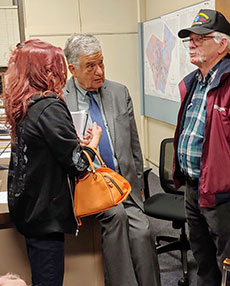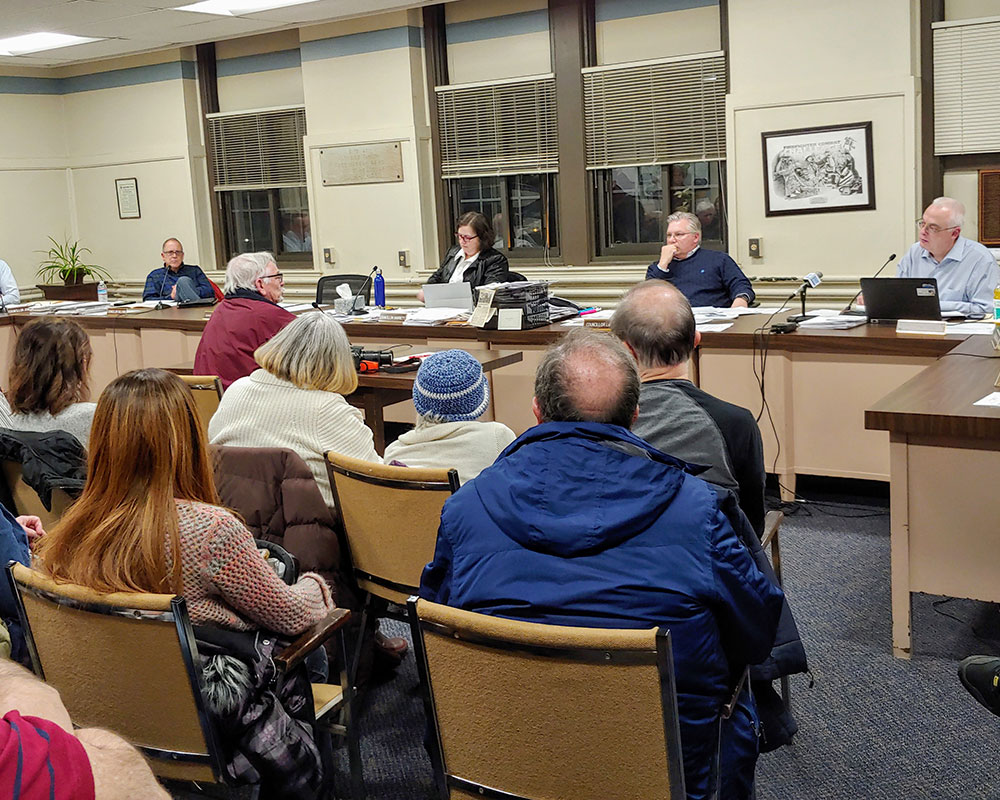Haverhill residents turned out en masse last night for a Citizen’s Outreach forum, presented by the City Council to gather public input on possible changes to the city charter.

Haverhill Mayor James J. Fiorentini talks one-on-one with residents at Citizen Outreach meeting on the city charter. (WHAV News photograph.)
The number one topic of discussion was a proposal by Mayor James J. Fiorentini to change the council to ward-based representation. Currently, all members of the City Council are elected on an at-large basis. The mayor says the current system leaves some members of the community under-represented.
While not every person that spoke at the meeting agreed on the details of such a change, such as whether there should be two or four at-large councilors, but they were overwhelmingly in favor of having all seven of the city’s wards represented on the Council. One in favor was Kathy Rurak, wife of former Mayor James A. Rurak who was unable to attend because of illness.
“I, Jim, support ward councilors and am open to district representation for the school committee. We are a diverse city and our elected officials should reflect that diversity,” according to the statement read by Mrs. Rurak.
District representation for the School Committee was another area where not everyone was on board. School Committee member Scott W. Wood Jr. said an overwhelming number of Massachusetts cities do not elect school committee members by district because it could lead to fighting over money for one particular school to the detriment of others.
“In a ward system, people might fight for money for a particular school, but that’s not in the best interests of the entire district. In a school yard, should you represent all of the kids playing there or just some of them?” Wood said.
He quoted a state education official’s advice from several years ago. The official said “Haverhill should become a school system and not a system of schools.” Wood notes, “This goes against everything they said we should be doing.”
Fiorentini has lobbied to have the Council approve a ballot question with the single question of ward representation on it. However, last month’s forum, “Exploring the Possibility of Neighborhood Representation,” introduced possible election of School Committee members by wards and limiting the mayor’s powers. (See related WHAV story.)
City Solicitor William D. Cox Jr. has said there are three ways to change Haverhill’s form of government—asking voters to simply vote on one of five other state-allowed charters, create a charter commission or going to the legislature for a “special act charter.” If choosing the latter option, the city could ask the legislature to approve a home-rule petition, have voters submit an initiative petition requiring at least 6,647 signatures or the current City Council can place the question before voters.
Other issues discussed last night included limiting the number of terms the mayor and City Council members should be allowed to serve and how long those terms should be. Although there wasn’t a clear consensus on any of those questions, most people suggested a four-year term would give elected representatives more time to get things done.

